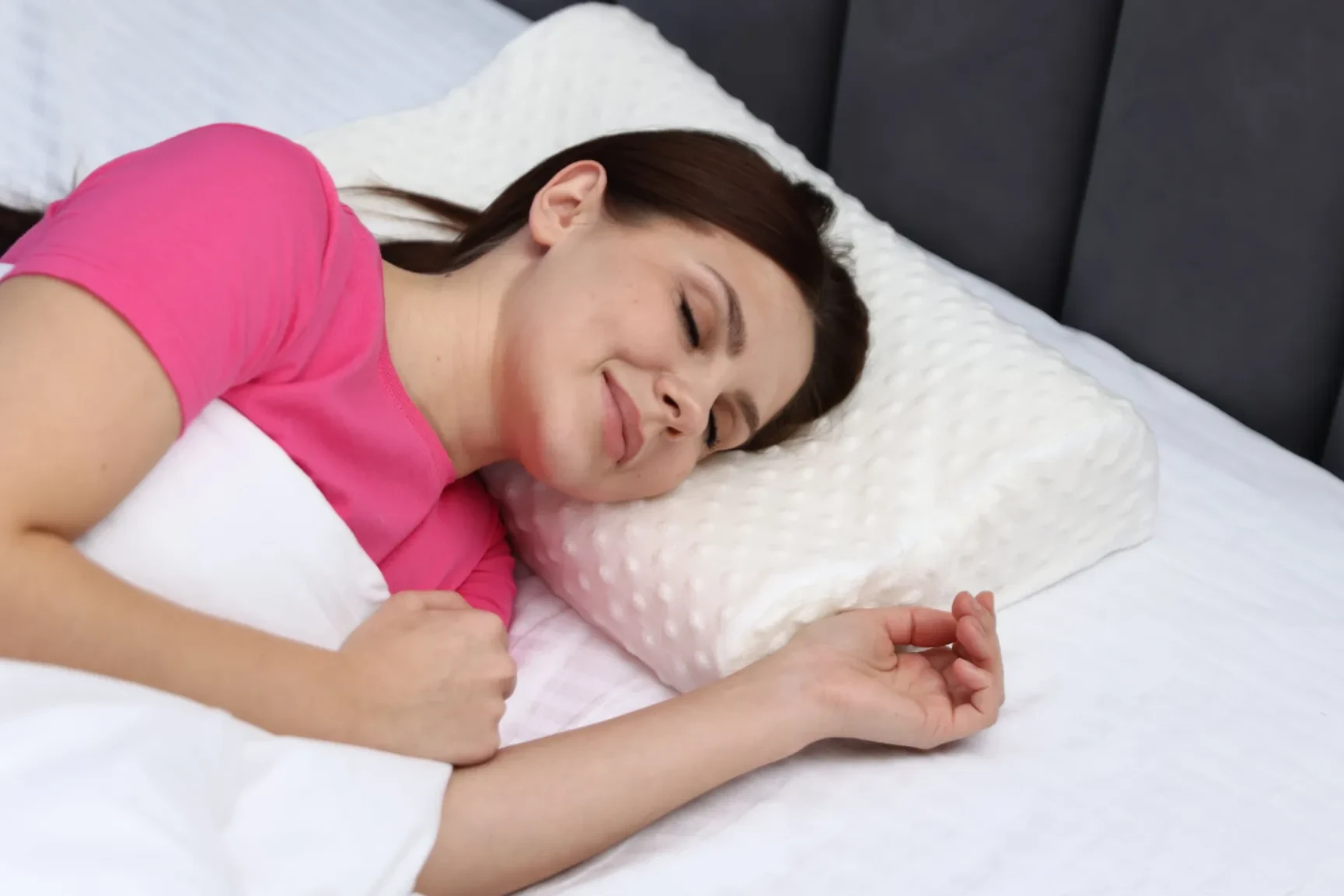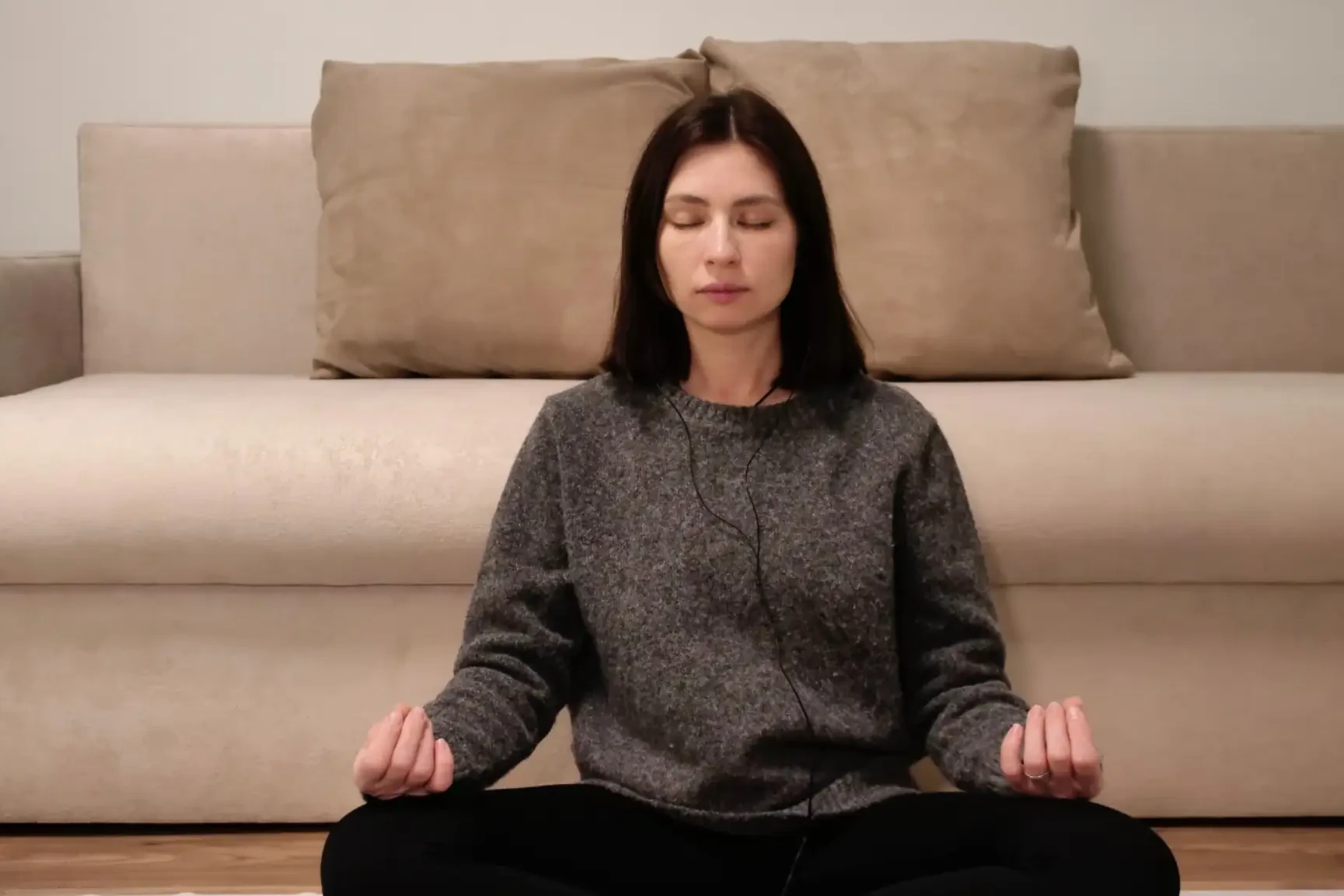Insomnia is a common sleep issue that makes it hard to fall asleep or stay asleep. If you’re having trouble staying asleep, it’s important to get help. The right treatment can improve your sleep quality and overall health. This article will cover five effective strategies to help you sleep better and wake up refreshed.
Good sleep is key for your health and mind. With the right techniques, you can take back control of your sleep. Let’s explore the best ways to fight sleep maintenance insomnia.
Table of Contents
ToggleUnderstanding Sleep Maintenance Insomnia
Sleep maintenance insomnia makes it hard to stay asleep all night. People with this issue might fall asleep but wake up a lot, feeling tired the next day. It’s important to know what it is, its symptoms, causes, and risk factors to manage it well.
Definition and Symptoms
Sleep maintenance insomnia means you can’t stay asleep. You might wake up a lot at night. It’s hard to fall asleep again, making your night sleep broken and not restful. The main signs of this insomnia include:
- Waking up multiple times during the night
- Difficulty falling back asleep after waking up
- Daytime sleepiness or fatigue
- Irritability or difficulty concentrating
Causes and Risk Factors
Many things can lead to sleep maintenance insomnia. Some common causes and risk factors are:
- Stress and Anxiety: Stress or anxiety can mess with your sleep cycle, making it hard to stay asleep.
- Irregular Sleep Schedules: Not having a regular sleep schedule can disrupt your body’s natural sleep rhythm.
- Medical Conditions: Health issues like sleep apnea, chronic pain, or GERD can affect your sleep.
- Lifestyle Factors: Things like caffeine, too much alcohol, and sitting too much can also cause sleep problems.
Knowing what causes and risks sleep maintenance insomnia helps in finding ways to fix it.
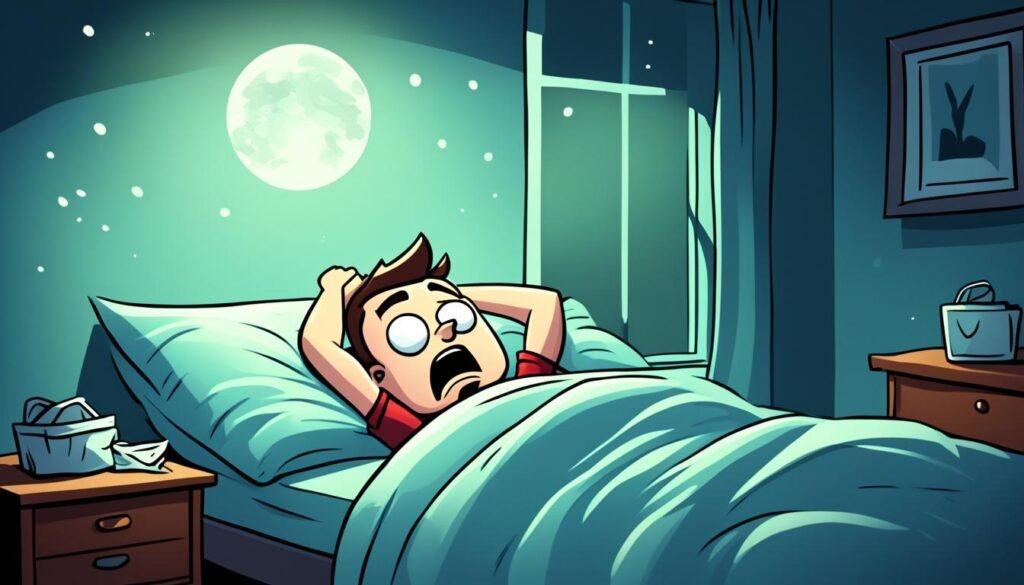
Establishing Good Sleep Hygiene
Getting quality sleep is key for your health and happiness. To fight sleep maintenance insomnia, focus on good sleep hygiene. This means making your bedroom sleep-friendly and sticking to a regular sleep schedule.
Creating a Sleep-Conducive Environment
Your bedroom’s setup affects how well you sleep. Here’s how to make it better:
- Keep your room dark, especially from blue light from devices, to help your body produce melatonin.
- Keep the room cool, between 60 and 67°F (15.6 and 19.4°C), for the best sleep.
- Make sure it’s quiet to avoid sleep disruptions.
- Choose a comfy mattress and bedding for your body’s support and relaxation.
Developing a Consistent Sleep Routine
Creating a regular sleep pattern is also key. Here are some tips:
- Go to bed and wake up at the same time every day, even on weekends, to keep your body’s rhythm.
- Avoid napping to help your nighttime sleep.
- Do relaxing activities, like reading or stretching, 30-60 minutes before bed to signal bedtime.
- Limit caffeine and alcohol to improve sleep quality.
By making your bedroom sleep-friendly and sticking to a routine, you can fight sleep maintenance insomnia and better your sleep.

Exercise for Better Sleep
If you’re having trouble sleeping, exercise could help. Studies say moderate cardio exercises are best for sleep. Adding simple stretches and deep breathing before bed can also help.
Weight lifting can reduce anxiety and depression, which helps with sleep. Yoga is especially good for improving sleep for certain groups, like older adults, women with sleep problems, and people with type 2 diabetes.
It’s important to exercise at the right time. Stop aerobic exercise 1 to 2 hours before bed to help your brain relax. Try to exercise for at least 30 minutes a day. You might see better sleep in just four weeks.
There’s a link between sleep and exercise. Good sleep makes you more energetic for workouts, and exercise helps you sleep better. Adding exercise to your daily routine can lead to better sleep.
Relaxation Techniques for Sleep Maintenance Insomnia
If you’re having trouble sleeping, adding relaxation techniques to your day can really help. Mindfulness meditation and yoga are great for reducing stress and anxiety. These are big reasons why people can’t sleep well.
Mindfulness Meditation
Mindfulness meditation means focusing on your breath and the now. It helps you stop thinking about stressful things. This makes it easier to relax and sleep better.
Studies show that doing this regularly can make your sleep much better. It’s a great way to fight sleep problems.
Yoga and Deep Breathing
Yoga and deep breathing are also good for sleep. They make your body and mind calm. This helps you sleep better.
These activities start your body’s relaxation response. They slow down your heart and breathing. This leads to better sleep.
Using these relaxation methods daily can really help with sleep issues. Taking time to relax and reduce stress sets you up for a good night’s sleep.
Dietary Changes to Combat Insomnia
What you eat and drink affects your sleep quality. To fight insomnia, cut down on caffeine and alcohol. Add sleep-promoting foods and nutrients to your diet.
Limiting Caffeine and Alcohol
Caffeine keeps you awake, so avoid it in the afternoon and evening. Alcohol might make you sleepy at first but can disrupt your sleep later, making it poor quality.
Incorporating Sleep-Promoting Foods
Some foods can help you sleep better. Foods rich in melatonin, like tart cherries, and those with magnesium, such as leafy greens and nuts, can improve sleep.
By changing your diet and adding sleep-promoting foods, you can improve your sleep and overall health.

Sleep Maintenance Insomnia and Cognitive Behavioral Therapy
If you’re not finding relief with lifestyle changes and home remedies, cognitive behavioral therapy (CBT) might help. CBT is a powerful, long-term treatment that changes your thoughts and behaviors to improve sleep. It teaches you how to sleep better and manage insomnia.
CBT-I is great for both short-term and long-term insomnia. Most people who try it see better sleep and quality of life. The treatment usually takes 6-8 sessions, but it depends on your needs. However, finding a therapist skilled in sleep medicine can be hard in the U.S.
In CBT-I, therapists work on changing negative thoughts and beliefs about sleep. They teach you techniques like stimulus control and relaxation to help you sleep better. These methods aim to reduce stress and anxiety related to insomnia.
About 70% to 80% of people with primary insomnia get better with CBT-I. For those with sleep maintenance insomnia, the success rate can hit 80%. If you’re dealing with ongoing insomnia, talk to a healthcare provider about cognitive behavioral therapy for insomnia.
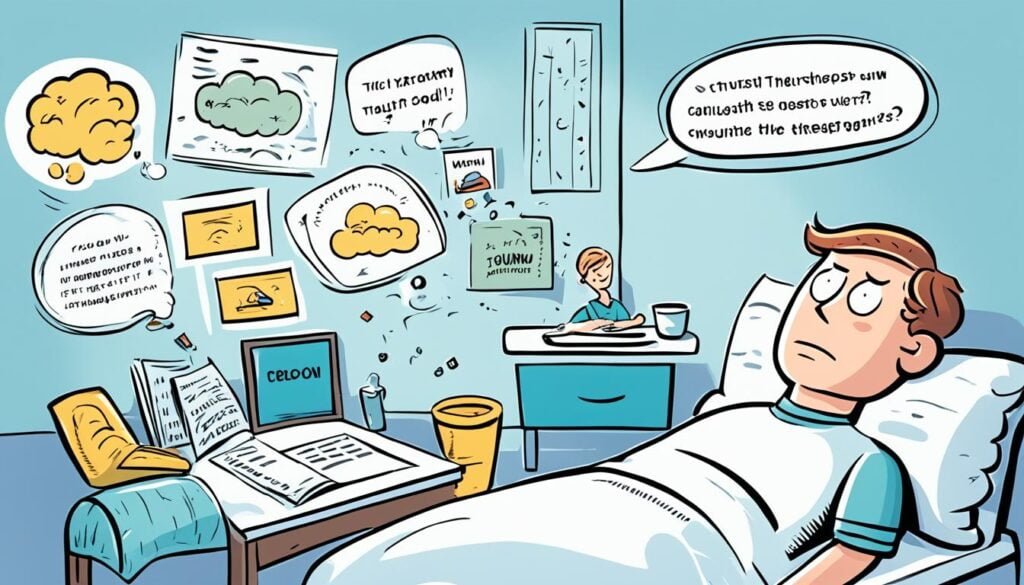
Light Regulation for Better Sleep
Getting enough sleep is key to feeling good, and managing your light exposure helps a lot. It’s important to avoid blue light since it can mess with your body clock and lower melatonin levels.
Avoiding Blue Light Exposure
Devices like smartphones, tablets, and computers give off blue light. This light can make your brain think it’s still day, making sleep hard. To help, cut down on blue light before bed.
Creating a Dark Sleep Environment
It’s not just about avoiding blue light; a dark room is also key for good sleep. Any light, from screens or streetlights, can mess with your sleep cycle. Use blackout curtains, an eye mask, or a sleep mask to keep your room dark.
By managing your light and making your bedroom sleep-friendly, you can sleep better and keep your body’s clock in check. This boosts your health and happiness.
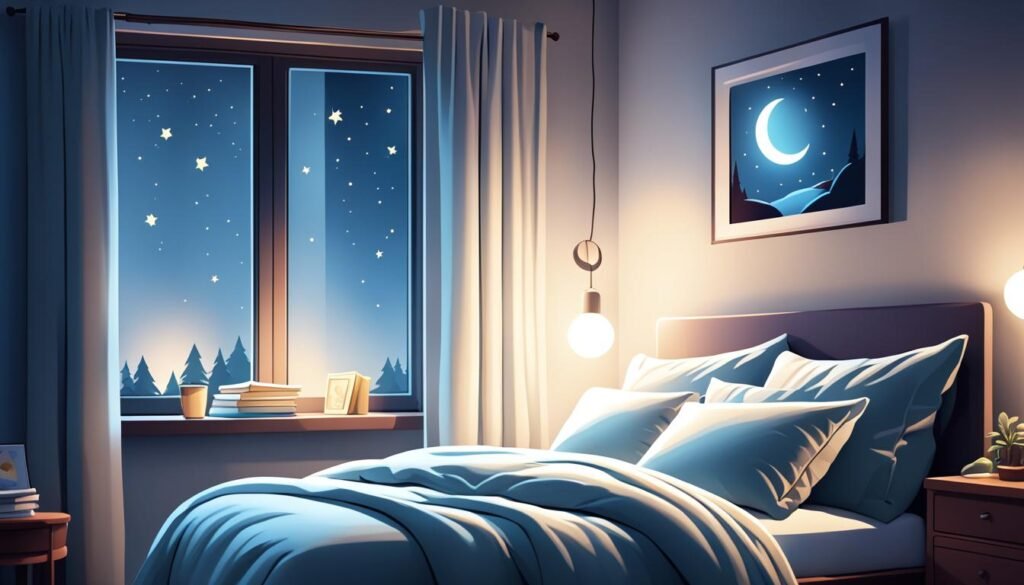
Natural Sleep Aids and Supplements
If you’re having trouble sleeping, natural sleep aids and supplements might help. Melatonin, a hormone your body makes, can make sleep better and help you fall asleep quicker. Herbal remedies like valerian, chamomile, and lavender can calm your mind and body, leading to better sleep.
Melatonin
Melatonin supplements, usually 3-10 mg, can make daytime sleep better and longer. This hormone helps control your sleep cycle, making it easier to fall and stay asleep.
Herbal Remedies
Herbs like valerian, chamomile, and lavender have been used for centuries to help sleep. Valerian root, 300-600 mg, can improve sleep quality and help with sleep disorders. Lavender aromatherapy also helps sleep, especially for older adults with dementia or heart disease.
Always talk to a healthcare professional before trying new sleep supplements. They might not mix well with your medicines or have side effects. By trying natural remedies and changing your lifestyle, you can find ways to improve your sleep.
Managing Stress and Anxiety
Stress and anxiety can really mess with your sleep. Using good stress management methods can help. Try being mindful, doing relaxing things, and talking to people you care about to handle stress and anxiety.
Mindfulness meditation is great for easing stress and helping you sleep better. It means focusing on now and letting go of worries. This can calm your mind and body, making it easier to sleep well.
Yoga and deep breathing are also good ways to reduce anxiety. They can slow down your heart rate, relax your muscles, and make you feel calm. This can lead to better sleep.
If stress and anxiety are really affecting your sleep, think about trying insomnia treatment like cognitive-behavioral therapy (CBT). CBT can help you change negative thoughts and behaviors that hurt your sleep.
Handling stress and anxiety is key to getting better sleep. By adding stress-reducing activities to your daily life, you can stop insomnia and sleep more peacefully.
Sleep Tracking and Monitoring
Tracking and monitoring your sleep can give you key insights into your habits. It helps you find out what affects your sleep. You can use devices, apps, or a simple diary to track your sleep.
Sleep tracking devices come in many types, like watches, bracelets, and mattress sensors. They track your heart rate, breathing, and more. This info helps you see how you sleep and what you can do better.
Remember, sleep trackers aren’t a replacement for doctor’s advice. They’re especially not for people with sleep problems like sleep apnea or chronic insomnia. For accurate sleep quality info, talk to a doctor and get a sleep study.
Unlocking the Power of Sleep Tracking
- Identify patterns in your sleep habits and quality
- Understand the impact of environmental factors on your sleep
- Recognize potential triggers for sleep maintenance insomnia
- Collaborate with your healthcare provider to address sleep-related issues
If you’re having trouble sleeping or want to sleep better, try tracking your sleep. It can be a big help. By understanding your sleep, you can make changes to sleep better and feel better overall.
When to Seek Professional Help
If you’re still struggling with sleep after trying home remedies and lifestyle changes, it’s time to get help. A healthcare provider or sleep specialist can check for health issues and create a plan just for you. They can help with sleep disorders.
Cognitive behavioral therapy (CBT) works as well or better than sleep medicines. Also, don’t use sleeping pills for more than a few weeks because they can make you feel groggy during the day and increase the risk of falling.
Exercise can help you sleep better, but taking naps might make it harder to sleep at night. Also, avoiding insomnia treatment substances like caffeine, alcohol, and nicotine can also improve your sleep.
If yoga, tai chi, or supplements like melatonin and valerian don’t help, see a sleep specialist. They can check your condition and suggest the right treatment.
Mental health care can also help improve sleep by focusing on mental health and well-being. With a professional’s help, you can find out what’s causing your sleep disorders and get back to sleeping well.
Sleep Maintenance Insomnia in Special Populations
Sleep maintenance insomnia can be tough for people during pregnancy and after having a baby. Hormones, physical discomfort, and stress from caring for a newborn can lead to insomnia during pregnancy and postpartum insomnia. It’s key for these folks to work with their doctors to find safe ways to better their sleep quality.
Pregnancy and Postpartum
Pregnant women often see big changes in their sleep. The first three months can make them feel very tired and sleepy during the day. Later on, they might find it hard to fall asleep and stay asleep. After the baby arrives, new moms might have trouble sleeping because of the baby’s needs.
Older Adults
As we get older, our sleep patterns and quality change. Older people might find it harder to sleep well. This can be due to health issues, medicines, or age-related sleep changes. Helping older adults with insomnia might mean making lifestyle changes, therapy, and possibly medication.
Conclusion
Sleep maintenance insomnia can really affect your health and happiness. By using the five tips we talked about, you can fight this sleep issue. These tips include good sleep habits, exercise, relaxing, eating right, and getting help when you need it.
Remember, many older adults, up to 75%, deal with sleep maintenance insomnia. Knowing what causes it and how to improve your sleep can help you take charge. This way, you can enjoy the benefits of good sleep.
If your insomnia doesn’t go away or worries about your health grow, don’t hesitate to get help. With the right advice and support, you can beat sleep maintenance insomnia. This will help you get the restful sleep you need.
FAQ
What is sleep maintenance insomnia?
Sleep maintenance insomnia means you can’t stay asleep all night. You might fall asleep but wake up a lot. This makes you feel tired and worn out during the day.
What are the causes and risk factors for sleep maintenance insomnia?
Stress, anxiety, and depression are common causes. So are uncomfortable sleeping conditions and irregular sleep patterns. Using drugs or alcohol and having sleep apnea can also disrupt your sleep. Changes in your body’s natural sleep cycle can lead to insomnia.
How can I establish good sleep hygiene to improve sleep maintenance?
Make your bedroom sleep-friendly by keeping it dark, cool, and quiet. Stick to a regular sleep schedule. This helps improve your sleep.
How can exercise help with sleep maintenance insomnia?
Exercise during the day can make your sleep better. But don’t work out too close to bedtime. Exercise can make it hard to fall asleep.
What relaxation techniques can I use to improve sleep maintenance?
Try mindfulness meditation, yoga, and deep breathing exercises. These can reduce stress and anxiety, helping you sleep better. They make it easier to relax and fall asleep.
How can dietary changes affect sleep maintenance insomnia?
Avoid caffeine and alcohol, which can mess with your sleep. Eating foods that help sleep, like those with melatonin and magnesium, can improve your sleep quality.
What is the role of cognitive behavioral therapy (CBT) in treating sleep maintenance insomnia?
Cognitive behavioral therapy (CBT) is a great long-term solution for insomnia. It changes your thoughts and behaviors that affect your sleep. You’ll learn healthy sleep habits and ways to cope with insomnia.
How can light regulation help with sleep maintenance insomnia?
Managing light exposure, like avoiding blue light from screens, is key. A dark sleep area also helps you sleep better.
Are there any natural sleep aids or supplements that can help with sleep maintenance insomnia?
Yes, natural sleep aids like melatonin and herbal remedies can help. But talk to a doctor before trying new supplements.
How can I manage stress and anxiety to improve sleep maintenance?
Use stress management techniques like mindfulness and relaxation. Doing things you enjoy and getting support from friends and family can also help.
Source Links
About The Author

Medically reviewed by Dr. Chandril Chugh, MD, DM (Neurology)
Dr. Chandril Chugh is a U.S.-trained, board-certified neurologist with expertise in diagnosing and managing neurological disorders, including migraines, epilepsy, Parkinson’s disease, and movement disorders. His clinical focus includes evidence-based neurological care and patient education.
All content is reviewed for medical accuracy and aligned with current neurological guidelines.



